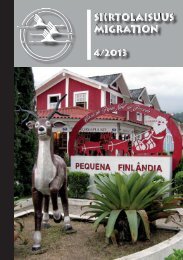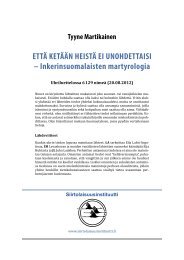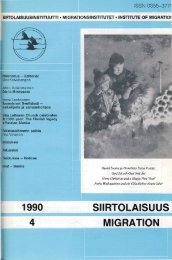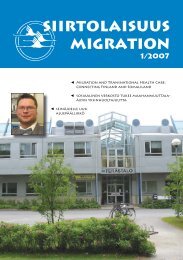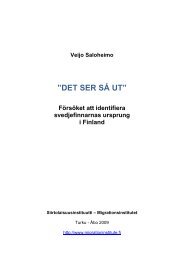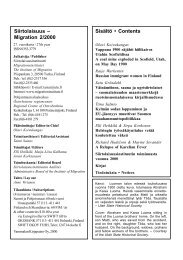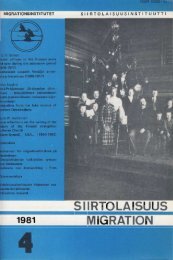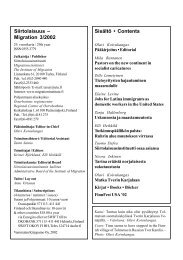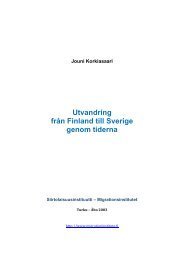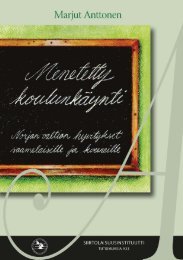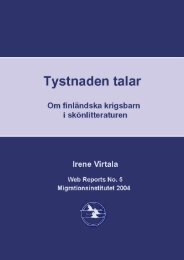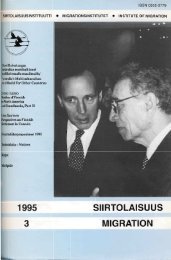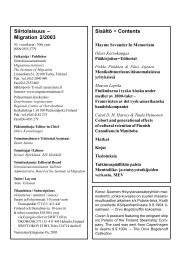1992 - 2 - Siirtolaisuusinstituutti
1992 - 2 - Siirtolaisuusinstituutti
1992 - 2 - Siirtolaisuusinstituutti
Create successful ePaper yourself
Turn your PDF publications into a flip-book with our unique Google optimized e-Paper software.
-.--_'<br />
Siirtolaisuus - Migration 2/<strong>1992</strong><br />
niifui ja adkkaaki tafrella o[ertat puktot be shaped and molded by parents, fami-<br />
ja mnantie, jossa a[inomsa, nafu:e mntfostaaia<br />
Lufker)an. Ldfieffa kptoani on uanha,<br />
suui futiou, jota eiaat iafrfraatkgiin i"frmiset<br />
muista sen pienempand. I(g[al[a on<br />
lies and other influences in society.<br />
Identity then is involved at two levels:<br />
the question of "who one is" and the<br />
corollary of "what does that mean?" As<br />
mei[iin fefimi[{amnu ftyo i.t fnitumet. " I contrast the values hinted at in Paavo's<br />
He ends his description of his "Kotiseutuni"<br />
with the same mixture of love<br />
and reality with which it began.<br />
"Oma futtiseutu tuntuu siis futi(kta mit-<br />
[uisiwna[ta; aaikka siind.ftn pitaa k^aa[-<br />
old letter, I can also hear the voices of my<br />
grandparents and parents as I was growing<br />
up here in the United States. My<br />
parents spoke Finnish at home and I was<br />
taught to treasure my heritage. But, in<br />
truth, there were no great cultural differta<br />
tyatta ruofumsa aflsaita."<br />
ences between what my parents had<br />
I am sure that the emigrants from Fin- learned about the world when they were<br />
land would have joined in that judg- children and what I learned during the<br />
ment. Life was not easy, nor should time I was growing up. There were<br />
people expect to find it so.<br />
many similarities betn'een the two cul-<br />
Paavo's letter from so long ago does tures. I learned to take saunas, eat Fin-<br />
provide a bit of insight into how he nish food, go blueberry picking on hot<br />
viewed himself within his surround- summer days, etc.<br />
ings. Naturally, evryone may see things I also learned that Finns were loyal,<br />
a bit differently. Is there a point of view brave, stubborn and had a deep love for<br />
that was typically Finnish?<br />
the lakes and forests, through which life<br />
Here in the United States, Jerome<br />
Kagan (1980) wrote of what he saw as the<br />
"requirements for human development".<br />
He saw the process of socialization<br />
as being successful if young people<br />
succeeded at those competencies that a<br />
particular culture felt to be important.<br />
American identity, he felt, involved individualism<br />
and autonomy, the ability to<br />
make decisions independently. Identity<br />
also involved learning and education, so<br />
that one could be employable and take<br />
care of themselves financially. Industriousness<br />
would certainly be another<br />
factor in identity as well as the<br />
Ioyalty to self to hy to do the best job that<br />
one could. Identity also involved valuing<br />
social relationships, family and friends<br />
and being valued by them as well. There<br />
is, Kagan felt, some kind of ideal best<br />
adult in every culture and it was to this<br />
goal that children's behavior tended to<br />
was renewed and deepened. I saw eyes<br />
crinkle up in laughter ... sometimes at a<br />
funny story that was told on themselves.<br />
I learned that Finns did the best they<br />
could and then clenched their teeth and<br />
went on with life even when it was hard.<br />
My father was 17 when he left Finland<br />
but I knew how important education<br />
was by the tears in his eyes when I<br />
finished my various school degrees.<br />
The world is complicated. Throughout<br />
our lives we listen to what is going<br />
on in the world. We read newspapers<br />
and magazines and books. We watch<br />
television and talk to people. We think<br />
our thoughts and make choices or have<br />
choices made for us. But we are active,<br />
thinking beings who can select from the<br />
options open to us. Socialization is usually<br />
not a random process. We hear what<br />
we expect to hear and choose what we<br />
see as valuable to teach our young.



